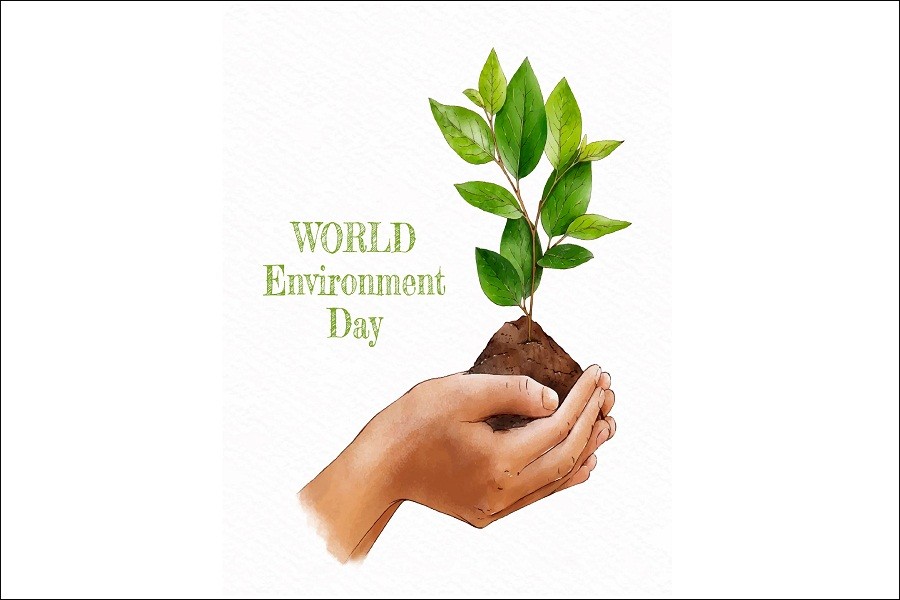Every year on 5th June, World Environment Day is celebrated across the globe to highlight the need and means of protecting our mother nature.
In 1972, the United Nations General Assembly established World Environment Day on the first day of the Stockholm Conference on the Human Environment. Only One Earth was the slogan on the 1972 World Environment Day. Fifty years later this year it will be observed with the same theme.
Pollution, ecological disruption and climate change occur when we withdraw more services and resources out of nature while discharging back into it massive amounts of contaminant and waste, in the process, altering the composition of water, air and soil.
The bleak picture of Bangladesh
Bangladesh ranked sixth among all the countries experiencing premature deaths due to pollution. The renowned medical journal, the Lancet assessed that about 2.15 lakhs of Bangladeshi people died prematurely due to air and water pollution in the year 2019 alone, where 1.75 lakh died from air pollution and 30,000 from water pollution.
Pollution creates a huge burden on the economy of a country as well. Bangladesh has incurred an economic loss of 3.5 per cent of GDP in the year 2015 due to pollution. On top of the pollution, Bangladesh is facing an existential threat as a result of climate change.
Bangladesh ranks seventh on the list of countries most exposed to climate catastrophe due to its geographical location, higher density of population and socioeconomic condition.
Bangladesh suffered economic losses worth USD 3.72 billion and witnessed 185 extreme weather events due to climate change from the year 2000 to 2019, despite emitting only 0.56 per cent of the world's greenhouse gas responsible for global warming.
Being a signatory of the Paris Climate Agreement, Bangladesh recently submitted the updated Nationally Determined Contributions (NDC) proposing a 6.73 per cent (27.56 MtCO2e) emission reduction in unconditional and an additional 15.12 per cent (61.91 MtCO2e) reduction in a conditional scenario from the business as usual level by 2030 from the sectors of energy, industrial processes and product use, agriculture, forestry, and other land use, and waste.
Is it only our fight?
The reality is that we are severely affected by climate change and we have to learn to fight by ourselves with our homegrown adaptation and resilience techniques.
The government should be the front fighter against climate change, ecological disruption, and environmental pollution. Whether at the national, global or regional level, the government is the main driver in pollution control and climate change.
As such, the government of Bangladesh needs to play the lead role to implement the cross-sectoral environmental and nature-friendly transformative change at scale. Policymakers of developed countries have been using market-based instruments to tackle pollution, those are proved efficient.
Implementing market-based instruments
India has also started to use market dynamics for pollution control. It is high time for Bangladesh to start applying market-based instruments like emission or pollution tax, tradeable permits, deposit-refund system and other instruments for pollution abatement, which is more efficient and requires less monitoring than the command and control (CAC) approach of pollution control.
Bangladesh can set either an optimal price (through a tax) or quantity (through a permit cap) for the target pollutant, and use market dynamics to ensure that the producers with the lowest costs of cutting pollution make the steepest cuts in emissions.
Financial sector can be the game changer
The financial sector can and must play an important role to fill the gap in financing for environment-friendly projects. Although, investment in sustainable and environmentally friendly projects already demonstrated a positive business case, yet financial industry of Bangladesh is sceptical to channel its money into it, unlike the world’s most renowned banks.
HSBC, Standard Chartered, JPMorgan Chase, Bank of America, Wells Fargo and other reputed banks are scaling up sustainable project investments more than before for their own profitability and business sustainability. Those banks set the standard that our local banks and the financial industry can follow without compromising their profit.
At the same time, the financial industry has the necessary control and freedom to make sure that their clients or potential borrowers are complying with the environmental and social standards.
Ideally, almost all the borrowers should get through a minimum environmental and social assessment process before getting loan approval. The Environmental Social Due Diligence conduct by banks prior to sanctioning the loan involves a set of procedures like checking EandS related certificates and analyzing the potential environmental and social impacts on nature that may create during the operation of the prospective borrower.
At the time of sanctioning the loan, the bank has the liberty to impose a clause or condition precedent regarding the non-compliances found during the due diligence.
Throughout the post-investment phase, a bank can raise its voice against its portfolio company in the case of non-compliance like shutting down its Effluent Treatment Plant, inadequate firefighting equipment, disturbance to the nearby community, and non-functioning environmental management system etc.
Sustainability is the next big thing. Today’s investors choose companies based on their commitment to strong Environmental, Social and Governance goals, popularly known as ESG.
Rivers are dying, groundwater is depleting, the sea level is rising, biota is becoming extinct, and entire ecosystems such as Sunderban might be destroyed. If we continue with our present course, we will face enormous challenges that we have never encountered before.
The writer is a banker and sustainable finance professional. He was awarded DAAD Scholarship to study M.Sc. degree in Landscape Ecology at the University of Greifswald, Germany. He also holds a postgraduate degree in Environmental Economics.


